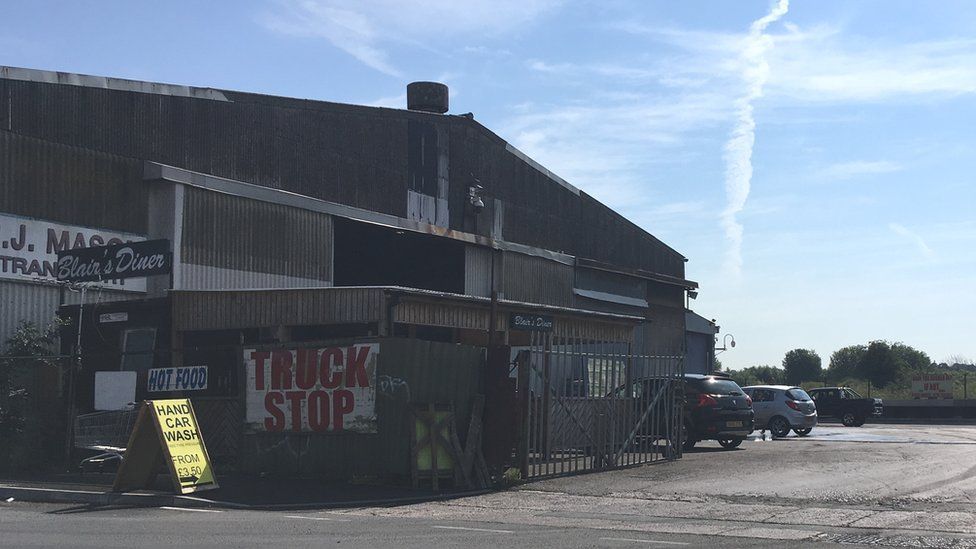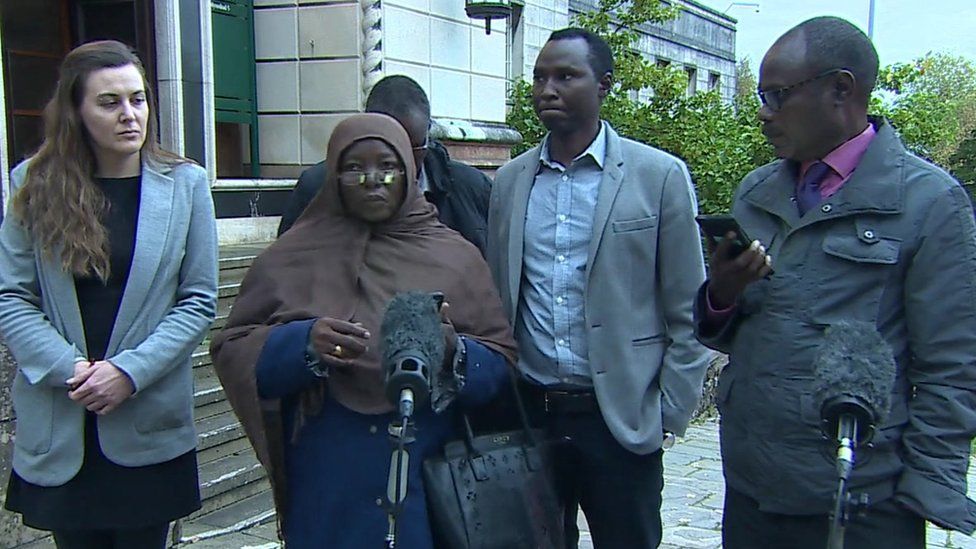
Asylum seeker inquest: Immigration officers may have had role in death
Mustafa Dawood, 23, suffered head injuries when he fell from the roof of a car wash while being chased by officers.
He had been working illegally at the Shaftesbury hand car wash in Newport when it was raided in June 2018.
Mr Dawood had fled persecution in his home country of Sudan.
However, his claim for asylum in the UK had been refused by the Home Office.
At an inquest in Newport, jurors concluded that a decision to abandon pursuing Mr Dawood was not "effectively communicated" to all officers.
The jury also found that officers did not move far enough away from him, and that one officer should not have held his baton in a "racked position" over his shoulder while Mr Dawood climbed up the warehouse doors.
Jurors also concluded that officers were not "appropriately trained in pursuit procedures".
The jury decided all of these matters had possibly contributed to Mr Dawood's death.
Coroner Caroline Saunders said she would be writing to the appropriate head of service because she had not heard that changes had been made to the pursuit policy.
The Independent Office for Police Conduct (IOPC) made a series of recommendations following the death to the Home Office in 2019, all of which were accepted.
These included the need for tailored risk assessments, better contingency planning and improved command officer support for operational staff when carrying out enforcement visits.
 Mustafa Dawood had been working at Shaftesbury car wash in Albany Street, Newport
Mustafa Dawood had been working at Shaftesbury car wash in Albany Street, Newport
The inquest at Gwent Coroner's Court heard immigration officers had arrived at Albany Trading Estate just after 10:00 GMT on 30 June 2018 following intelligence that foreign nationals were working there illegally.
They chased Mr Dawood, who ran onto the roof of a warehouse, believing he would be arrested.
The officer in charge, Matthew Day, said he called off the pursuit due to concern about Mr Dawood's safety.
However other officers present that day said they did not remember receiving an order to stop.
While running away, Mr Dawood fell through plastic roofing into a locked room below, where he was eventually found with "severe and fatal" head wounds.
'My son was not a thief or a murderer'
Officer Gregory Williams told the court Mr Dawood would not have been arrested and instead would have been told to go home, while the car wash would have been fined.
Mr Williams claimed he would not have been deported, given the current situation in Sudan.
During the week-long inquest, the jury heard Mr Dawood was from the Zaghawa tribe in the Darfur region of western Sudan, a non-Arabic group who face ethnic cleansing by local Arab militia groups.
Mr Dawood's mother, Hameda Hamed Shogar Ahmed, who was present in court throughout the inquest, described how her son found himself in increasing danger in Sudan and fled to the UK in 2015.
She said: "(In Sudan) there is so much killing every day, so many young people are killed or disappeared - that's why our young men have to flee to avoid the same destiny.
"My son was not a thief or a murderer, he was just a young person asking for safety."
'I hope lessons will be learned'
 Hameda Hamed Shogar Ahmed says Mustafa would not have died if officers were well-trained
Hameda Hamed Shogar Ahmed says Mustafa would not have died if officers were well-trained
Speaking through an interpreter after the inquest, she said the family was pleased with the jury's findings.
"By listening to the testimony of the witnesses, several facts became apparent to us. The immigration officers were not well trained, and if they had been, this disaster would not have not happened," she said.
She also said the officers made "serious mistakes when pursuing Mustafa".
She added that his asylum support money had been stopped temporarily shortly before his fatal fall and the family "believe it was why he was working at the car wash".
"I hope lessons will be learned from Mustafa's death," she said.
'Desperately sad'
IOPC director Catrin Evans said it was "desperately sad" that Mr Dawood died in "such awful circumstances" after fleeing his own country to seek safety in the UK.
She said the IOPC found there was "no evidence" that Mr Dawood's death could have been "reasonably foreseen by those present", as he had ran off almost immediately after officers arrived.
"Our investigation concluded that the officers' actions were broadly in line with policies and procedures and no individual immigration enforcement officer behaved in a manner that would justify disciplinary proceedings," she said.
"However, we identified significant organisational learning to try to help better safeguard individuals when suddenly encountering immigration officials in such circumstances."
Ms Evans said the recommendations would help to "reduce the risk of others being injured in the future and should serve to develop practice and procedures within immigration enforcement to improve public confidence".










